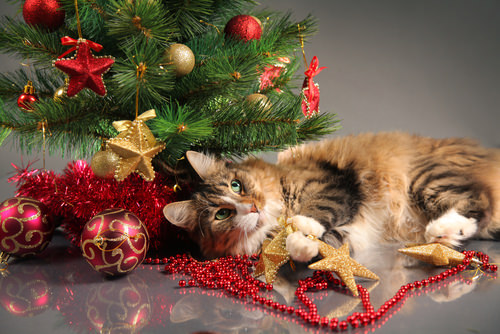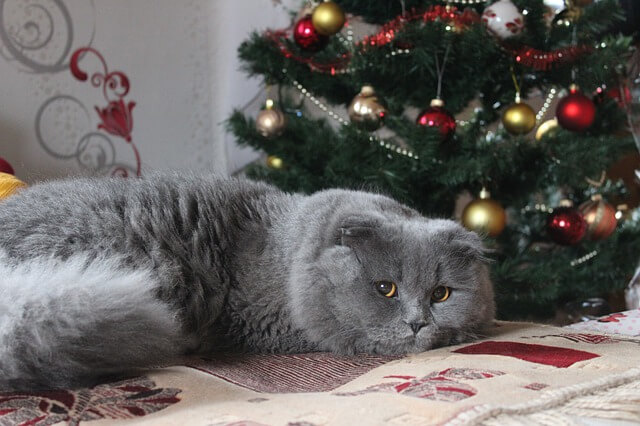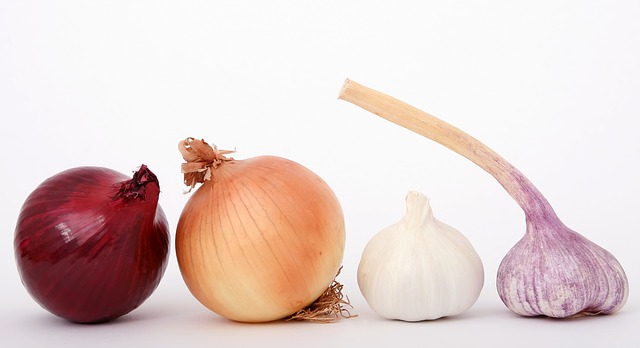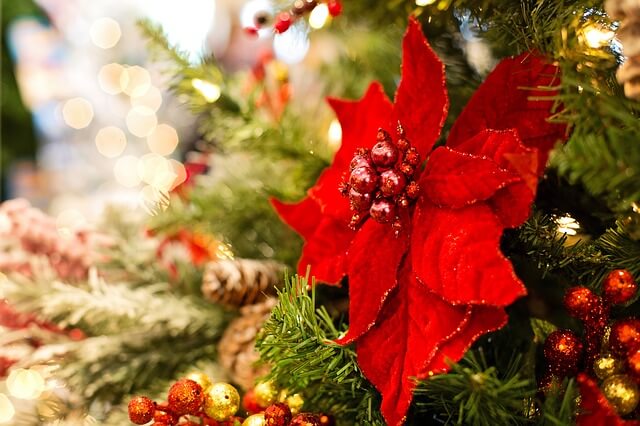Here come the holidays with all the trimmings. There are a few things that you should know to keep your cat safe.
Mistletoe– Real mistletoe is very toxic to cats (as well as humans). If you hang it, make sure it stays out of reach. Curious cats might well chew on this decorative plant. Symptoms of ingestion can include some very bad signs, like GI upset, cardiac collapse, and erratic behavior. If your cat is acting strange, go to the animal ER as soon as possible and mention that you have mistletoe at home.

Tinsel-Tinsel, like Easter grass, is a holiday danger. Cats especially find tinsel and grass fascinating and will eat them. The trouble is, as your cat gnaws and plays, those long strands of indigestible, virtually unbreakable, synthetic strips can become wrapped around the base of the tongue where they are not visible. When its other end is swallowed it cannot pass because it is anchored in the mouth, causing the intestine to bunch up like an elastic waist band. This presents a surgical emergency, and the prognosis worsens if treatment is delayed.
Ornaments– Christmas tree ornaments are alluring for cats. Keep your tree and other decorations inaccessible when possible. If pets must be unattended during the holidays, it might be wise to confine them to a safe room or crate. Surgical foreign body removal can be economically expensive and medically life threatening. Products are available for teaching pets to avoid danger, however, and a hidden transmitter with a diameter zone can provide invisible protection around the Christmas tree with a humane buzz.

Electric cords– Electric cords are interesting to pets, but chewing them causes burns in the mouth and some serious secondary complications, such as fluid in the lungs. You need emergency help if your cat bites an electrical cord.
Open doors– Many cats escape and are lost in the dark when doorways are so frequently open for guests. It is always a good idea to microchip your pet, even indoors-only ones. Be SURE to register the chip with an international database and keep your info current. House guests might not realize the cat is not allowed outdoors.
Spices– It often comes as a surprise that what seems like an indulgent treat for a cat may actually be a health hazard. For example, no matter how much you yourself enjoy a nice dish of spaghetti, anything with garlic and onions can harm your cat so resist your inclination to share it. Abnormal destruction of red blood cells (hemolytic anemia) and gastrointestinal difficulties may be the dangerous, unintended consequence.

Hustle and Bustle– With new people, and probably lots of them, both children and adults, joining you during the holidays, your pet is seeing lots of new faces, hearing lots of new voices, and smelling lots of new scents. Often cats don’t like noise or strangers. Try to be sensitive to your cat’s needs. Give him/her a safe place to hide and warn guests. Make sure your cat can easily access the litterbox without confronting a crowd; otherwise, you could be asking for surprises.
Poinsettia often appears on holiday hazard lists, although the ASPCA website says that these plants are “generally over-rated in toxicity.” Eating it could still cause stomach upset though, so keep cats away, but if your cat plays with a poinsettia, don’t panic.
Holidays make the winter warmer with love and fun. They are a time to enjoy friends and family. As you celebrate loved ones, include the ones with fur.

